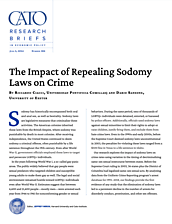In the years following World War I, a so-called gay panic arose. The public widely believed that gay people were sexual predators who targeted children and susceptible young adults to make them gay as well. The legal and social environment remained hostile toward LGBTQ+ individuals even after World War II. Estimates suggest that between 6,600 and 21,600 people—mostly men—were arrested each year from 1946 to 1961 for nonconforming gender or sexual behaviors. During the same period, tens of thousands of LGBTQ+ individuals were detained, extorted, or harassed by police officers. Additionally, officials used sodomy laws against sexual minorities to limit their rights to adopt or raise children, justify firing them, and exclude them from hate crime laws. Even in the 1990s and early 2000s, before the Supreme Court deemed sodomy laws unconstitutional in 2003, the penalties for violating these laws ranged from a $500 fine in Texas to a life sentence in Idaho.
Our research explores the impact of sodomy laws on crime rates using variation in the timing of decriminalizing same-sex sexual intercourse between states. Before the Supreme Court ruling in 2003, 36 states plus the District of Columbia had legalized same-sex sexual acts. By analyzing data from the Uniform Crime Reporting program’s arrest database for 1995–2018, our findings provide the first evidence of any study that the elimination of sodomy laws led to a persistent decline in the number of arrests for disorderly conduct, prostitution, and other sex offenses. Additionally, our research shows a reduction in arrests for drug and alcohol consumption following the repeal of sodomy laws, and it also suggests a drop in the number of suicides among men. These findings are consistent with the hypothesis that repealing sodomy laws improved the mental health of LGBTQ+ individuals, reduced stress among sexual minorities, and led to a decrease in substance abuse as a coping mechanism for nonheterosexual people.
These findings are crucial for policymakers, as they can aid international institutions such as the World Bank and the European Union in accurately assessing the costs and benefits of pressuring or suspending foreign aid to countries that blatantly violate basic LGBTQ+ rights. There are still several countries in the world where same-sex sexual activity is still illegal, and some countries have recently passed laws that explicitly target LGBTQ+ individuals. International institutions must balance promoting economic development and avoiding undue political interference with deterring human rights violations and protecting their employees working in those countries. Our research highlights additional costs related to the enactment and enforcement of sodomy laws and other anti-LGBTQ+ legislation, providing valuable information to guide international decisionmakers. Likewise, this analysis outlines the potential benefits of decriminalizing same-sex sexual intercourse for policymakers in countries that still persecute gay people.
Note
This research brief is based on Riccardo Ciacci and Dario Sansone, “The Impact of Sodomy Law Repeals on Crime,” Journal of Population Economics 36 (2023): 2519–48.

